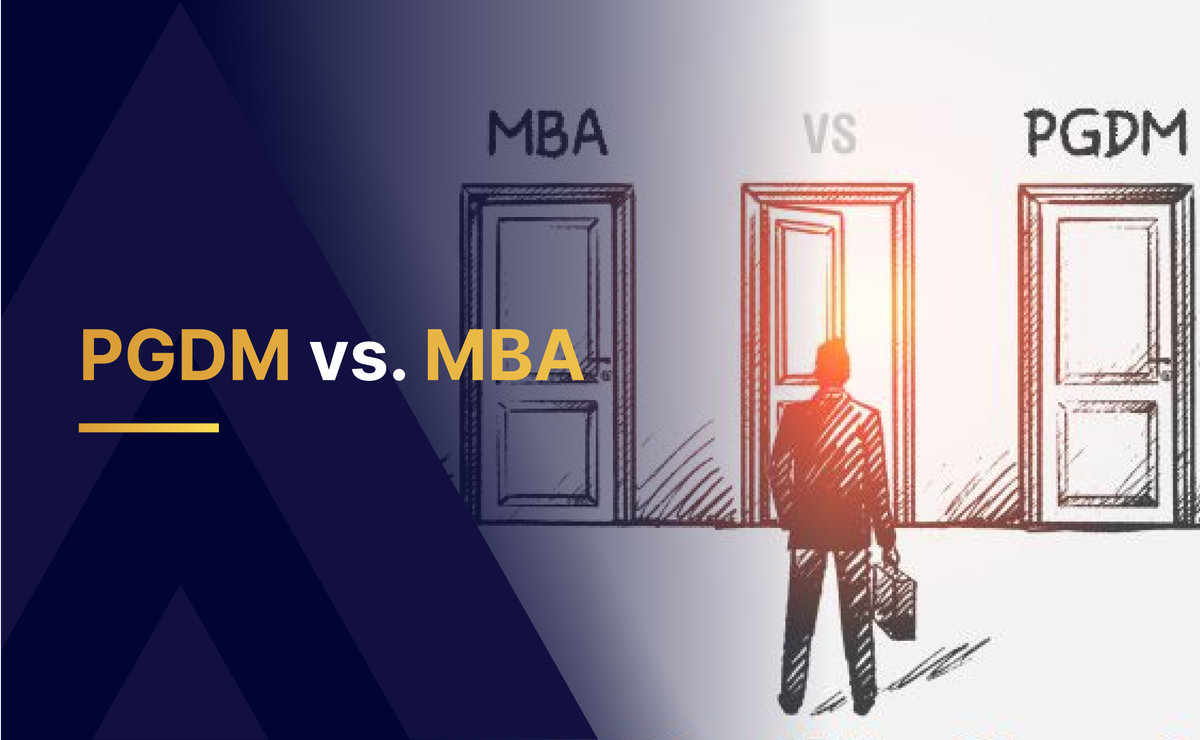PGDM vs. MBA: Which is better?

While an MBA is a university-affiliated degree with a structured academic approach, a PGDM is a diploma from autonomous institutes, often offering a more industry-relevant and flexible curriculum tailored to current market needs.
The traditional management education system, though great at providing theoretically comprehensive learning opportunities, may, however, lack the ability to incorporate the essence and requirements of changing industry dynamics, especially the business world. Additionally, how someone chooses the best path for themselves among distinct types of courses in business education is also a huge dilemma.
Some of the most popular courses in this space are:
- Post Graduate Program (PGP): Typically offered as a certification course.
- Post Graduate Diploma in Management (PGDM): A diploma course designed for advanced business education.
- Master of Business Administration (MBA): A professional degree program providing comprehensive business expertise.
Each of these programs has its own benefits and specialties that help students achieve high-paying jobs in India and strengthen their competitive prospects. This article, therefore, tries to understand the details between MBA vs. PGDM, how they differ, and which path can be most beneficial for you in the long run.
What is PGDM?
Post Graduate Diploma in Management (PGDM) is a two-year program in management studies, offered by autonomous institutions approved by the All-India Council for Technical Education (AICTE). Though labeled a "diploma," the PGDM is commonly accepted as being on par with an MBA in terms of credibility and value.
- Flexibility: Institutions offering PGDM enjoy greater flexibility in designing their curriculum, allowing them to incorporate the latest industry trends.
- Industry-Relevance: The curriculum is practical and dynamic, often including emerging disciplines like AI, business analytics, and design thinking.
- Focus on Skills: PGDM emphasizes case studies, internships, live projects, and leadership development programs for holistic learning.
What is an MBA?

Institutions or universities accredited by the University Grants Commission (UGC) in India award the globally respected Master of Business Administration (MBA) degree to graduates. It is a comprehensive degree course that helps students gain a deep understanding of business principles and the functionalities they require to excel in managerial roles.
- Structured Curriculum: MBA programs typically follow a standardized curriculum set by the UGC.
- Theoretical Depth: The focus is more on theoretical and academic aspects of business and management.
- Global Recognition: As a degree, MBA is widely recognized and holds prestige in academia and public sector jobs.
Difference Between MBA, PGDM, and PGP
Let us explore some key factors that differentiate between MBA, PGDM, and PGP courses.
Curriculum:
MBA: The MBA syllabus follows the UGC guidelines to cover a wider range of core management subjects in areas such as accounting, business communication, strategy, data analytics, economics, finance, leadership, and management control. The curriculum is rigid and designed in a way that focuses on the theory of the academic disciplines imparted to students.
PGDM: The curriculum is highly adaptable. It is designed in accordance with the AICTE that combines the core subjects of business management with specializations in areas like marketing, finance, human resource management, etc. This provides students an opportunity to delve into their specific interests while gaining valuable additional expertise.
PGP: A PGP program typically follows a term-based system, with each semester focusing on specific areas and functionalities in addition to placing a strong emphasis on core business management subjects. The curriculum is flexible and is updated with changing industry standards while incorporating case studies, simulations, projects, and internships in their pedagogy to provide students with practical experience in applying theoretical knowledge.
Admission Eligibility:
MBA: When it comes to the admission process for MBA specializations, universities usually follow the UGC guidelines and require you to take and score well on standardized entrance exams like the CAT, GMAT, XAT, etc. Some courses may even accept alternative exams specific to the university, work experience, and other requirements based on your profile.
PGDM: PGDM courses involve a combination of basic requirements, like a bachelor’s degree with a minimum percentage, entrance exam scores, personal interviews, and occasionally, work experience of typically 2 to 3 years, to determine your eligibility. However, some institutes might accept alternative exams or waive off the work experience requirements based on your candidacy and academic achievements.
PGP: PGPs are typically industry-backed programs and may require a proper bachelor’s degree with a good score from a recognized university. Additionally, certain globally recognized institutions, like the IIM, require standardized test scores like CAT and GMAT or may require you to take institution-specific aptitude tests to determine your PGP eligibility.
Autonomy and Accreditation:
MBA: Mba degree are usually offered by universities accredited by the UGC, they may have the most regulatory oversight and specification standards when compared to PGPs and PGDMs for a set syllabus.
PGDM: Autonomous institutions offer such courses and often exercise more flexibility in designing and changing their curriculum. Such programs are backed by AICTE to uphold its standard, which adds to the credibility of the diploma and is considered equal to an MBA degree.
PGP: Prestigious institutes like the IIMs offer PGP courses in all of their institutions. PGP courses are often backed by popular companies in the industry. They work with professionals from the industry, who act as mentors and tutor the students, provide internship opportunities with leading organizations, and tailor their curriculum to meet the skill requirements necessary for today’s job market.
Area of focus:
MBA: The traditional MBA course places a lot of emphasis on academics and is theoretically motivated to give students a solid foundation in a variety of business domains as well as a range of management principles.
PGDM: Although these programs are comparable to an MBA, they might place more emphasis on the real-world application of specializations in fields like operations, marketing, finance, etc. To give students the experience and skills they need, they also incorporate new developments in business management seen in the industry.
PGP: Since PGPs are developed as new-age programs, it puts a higher emphasis on practical learning opportunities that traditional MBAs broadly lack. Such programs put a higher focus on developing skill-based competence in specific niches with the help of industry collaboration and help candidates stand out among others in the job market.
If you’re leaning towards a PGP as your preferred pathway to management expertise, the Applied Marketing PGP offered by the Altera Institute of Management (AIM) is worth exploring.
This is a one-year specialist program that focuses on empowering students to break into new age, high-growth roles in brand, marketing, and product management. It features an industry-backed curriculum designed in collaboration with leading companies like Amazon, HUL, and Mamaearth.
The Altera Institute reimagines professional education through:
- Immersive case studies that mirror real-world marketing challenges
- Interactive simulations that test strategic thinking
- Hands-on project work that builds tangible skills
- Mentorship from seasoned industry veterans
This approach goes beyond textbooks to create a practical learning environment and help students be job ready as they graduate.
Colleges Offering MBA and PGDM
Let’s look at some of the top colleges in India offering PGDM courses:

- Xavier School of Management (XLRI), Jamshedpur
- S.P. Jain Institute of Management and Research, Mumbai
- International Management Institute (IMI), New Delhi
- Management Development Institute (MDI), Gurgaon
- Institute of Management Studies (IMS), Ghaziabad
Let’s look at some of the top colleges in India offering an MBA degree course:
- Narsee Monjee Institute of Management Studies (NMIMS), Mumbai
- Indian Institute of Technology (IIT), Bombay
- Indian Institute of Technology (IIT), Delhi
- Symbiosis Institute of Business Management, Pune
- Faculty of Management Studies (FMS), Delhi
MBA vs. PGDM: Which is Better?
While both programs prepare students for leadership roles in the business world, they differ in various aspects and overall approach. To determine which is better for you, it’s important to align the program with your career goals, learning preferences, and the specific institutions you’re considering. Here's a comprehensive guide to help you make an informed decision.
- An MBA is an excellent choice for students who aim for academic careers or want to pursue higher education such as a Ph.D.
- PGDM programs ensure that the course meets the latest industry standards. This provides higher value in terms of career growth, especially when offered by top-tier institutions.
- Students who like structured learning with a focus on theory and research will find MBAs more suitable to their learning preferences. With a focus on academic depth and theoretical frameworks, MBA provides a more rigid curriculum to students.
- PGDM programs typically focus on a curriculum that is highly practical and aligned with current industry requirements. If you prefer a more application-based approach to learning and want to stay aligned with industry developments, a PGDM might be the better choice.
- Students seeking a more immersive experience with a strong foundation in general management, a two-year MBA would be the more appropriate option for them.
- Conversely, if students have work experience and want to specialize in their niche, a full-time PGDM will be a more attractive choice. If you know exactly where you want to focus, a PGDM can offer more specialized options.
- The MBA is widely recognized on a global scale, offering advantages for students aspiring to build careers in international markets. Many top global companies prefer MBA graduates due to the rigorous academic training and the brand reputation associated with top-tier universities.
- PGDM courses, although considered equal to an MBA degree in India, are however less recognized globally. Hence, students who are sure about building a career in their niche in this country will have no problem pursuing a PGDM course.
- Both MBA and PGDM graduates enjoy strong career prospects. An MBA is typically more suited for those interested in management positions within large multinational corporations, academic roles, or government jobs where degrees hold more significance.
- PGDM graduates, on the other hand, are often preferred for roles in industries that demand practical business knowledge, such as startups, consultancy firms, and tech companies. Such graduates are often seen as more adaptable and job-ready by recruiters.
Career prospects and opportunities for MBA and PGDM professionals
Both MBA and PGDM courses are designed to equip students with essential management and leadership capabilities. However, the career prospects and opportunities for graduates can vary depending on the program's focus, the reputation of the institution, and individual specialization.

Career Opportunities for PGDM Professionals:
- Marketing Manager: Marketing managers are highly sought after in diverse industries, including FMCG, technology, and retail. This role offers significant career growth, potentially leading to positions like Chief Marketing Officer (CMO).
- Financial Analyst: These professionals operate in sectors like banking, investment, and corporate finance, often advancing to roles such as finance manager or investment banker as they gain experience.
- Human Resources (HR) Manager: HR professionals are indispensable across all sectors, ensuring workforce productivity and satisfaction. Such professionals can progress to top-tier positions like HR Director or Chief People Officer over time.
- Operations Manager: Operations managers are critical in industries like manufacturing, logistics, and services, with potential to move into senior management or strategy roles.
- Product Manager: This role is especially prominent in sectors such as technology and e-commerce, with seasoned professionals advancing to titles like Head of Product or Chief Product Officer.
- Entrepreneur: Many PGDM graduates leverage their education to build successful startups, benefiting from the program’s emphasis on practical, industry-relevant knowledge.
Top MBA Career Profiles and Opportunities:
- Business Analyst: This role is ideal for professionals interested in bridging technology and business, with opportunities to advance into strategic planning roles.
- Investment Banker: A highly lucrative field, investment banking offers opportunities in global financial hubs, with career progression to positions like managing director or partner.
- Product Manager: Product managers in MBA roles focus more on strategy, offering a path to executive leadership positions.
- Operations Manager: Operations managers with an MBA often take on broader strategic responsibilities, leading to roles like COO (Chief Operating Officer).
- Project Manager: Project managers are in demand across industries like IT, construction, and consulting, with growth potential to Program Manager or Portfolio Manager roles.
While both MBA and PGDM graduates get access to high-paying roles, the average salary and job opportunities often depend on the reputation of the institution and the industry.
Some industries, like finance and consulting, prefer MBAs due to their theoretical and strategic focus. In contrast, industries like technology and startups value the practical, hands-on approach of PGDM graduates.
FAQs:
Q1. How do PGDM vs. MBA programs compare?
Ans: PGDM and MBA are not completely the same, although both are postgraduate programs in management. The MBA, a degree program, is offered by UGC-recognized universities and affiliated institutions.
While PGDM is a diploma program typically offered by autonomous institutions governed by the AICTE. Though both programs aim to cultivate leadership and management expertise, they differ in terms of accreditation, curriculum design, and areas of focus.
Q2. What is the PGDM Vs. MBA salary in India for graduates?
Ans: There is no set average salary for a PGDM or an MBA graduate. Salary largely depends on the institution, specialization, and industry. Other factors, like industry demand and personal performance, significantly influence salary outcomes for both.
Q3. Is PGDM equivalent to an MBA?
Ans: In India, a PGDM program is treated as equivalent to an MBA if it has AICTE accreditation. However, internationally, the recognition of a PGDM may vary, as MBAs are given more preference and are universally recognized degrees. However, both are respected qualifications in the industry and provide strong career prospects.
Summing Up
Deciding between an MBA, a PGDM, or even a PGP should align with your professional aspirations, learning style, and the prestige of the institution offering the program. While MBAs offer global recognition and a structured theoretical approach, PGDM programs stand out for their industry relevance and practical focus.
PGPs, on the other hand, cater to niche, skill-based learning in collaboration with industry leaders. If you are interested in marketing and want to do a PGP course, do check out the Altera Institute’s PGP in applied marketing. It provides more than just education. It offers a launchpad for marketing excellence.
Regardless of your choice, each program equips you with the skills and opportunities to excel in the competitive business landscape. Align your decision with your aspirations, research institutions thoroughly, and focus on building a strong foundation for a successful career.





